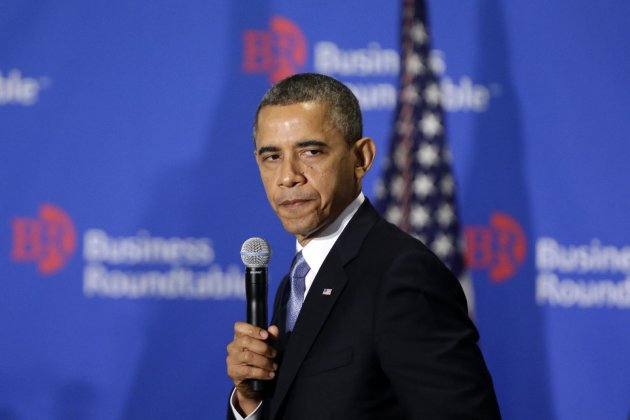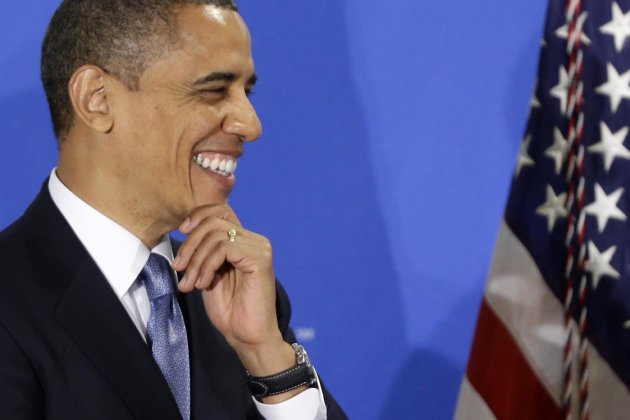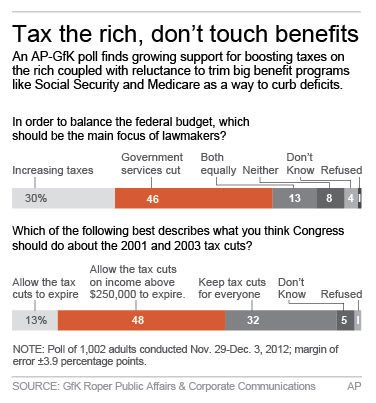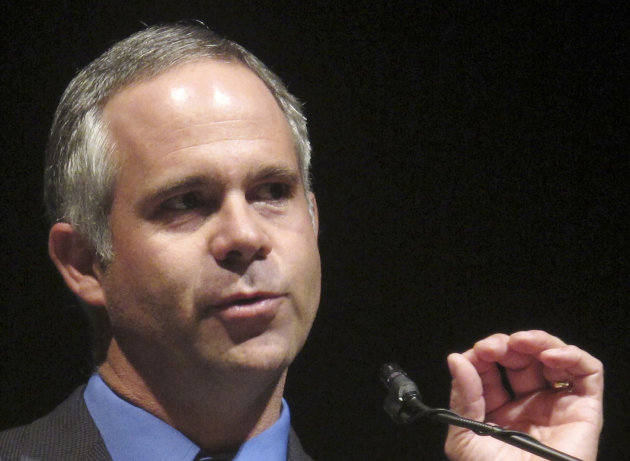
Hewing to a hard line,
President Barack Obama warned
congressional repugicans on Wednesday not to inject the threat of a
government
default into complex fiscal cliff negotiations aimed at avoiding
year-end tax increases and spending cuts that could harm the economy.
"It's not a game I will play,"
declared Obama as repugicans struggled to find their footing in talks
with a recently re-elected president and unified congressional Democrats.
Among the repugicans, Sen. Tom Coburn of Oklahoma became the latest
to break ranks and say he could support Obama's demand for an increase
in tax rates at upper incomes as part of a comprehensive plan to cut
federal deficits.
Across the Capitol, House Majority Leader Eric Cantor said repugicans want to "sit down with the president. We want to talk specifics." He noted that the repugicans had made a compromise offer earlier in the week and the White House had rejected it.
Since then, neither Obama nor
congressional Democrats have signaled interest in negotiations that both
sides say are essential to a compromise. Presidential aides have even
encouraged speculation that Obama is willing to let the economy go over
the "fiscal cliff" if necessary and gamble that the public blames repugicans for any fallout.
Eventually, Democrats
acknowledge, there will be compromise talks, possibly quite soon, toward
an agreement that raises revenues, reins in Medicare and other government benefit programs, and perhaps raises the government's $16.4 trillion borrowing limit.
For now, the demonstration of presidential inflexibility appears
designed to show that, unlike two years ago, Obama will refuse to sign
legislation extending top-rate tax cuts and also to allow public and
private pressure to build on the repugican leadership.
So far, the repugican cabal has offered to support non-specified increases to
raise tax revenues by $800 billion over a decade but has rejected
Obama's demand to let the top income tax rate rise from 35 percent to
39.6 percent.
To buttress their case, repugican officials in Congress pointed to
numerous proposals that Obama has previously advanced that could
generate the same amount of revenue he is seeking — without raising
rates. The list includes limiting the tax deductions taken by
upper-income taxpayers, raising taxes on the oil and gas industry and
curbing or eliminating the deductibility of tax-exempt bonds.
Separately, in a bit of political theater, Senate repugican leader
Mitch McConnell urged Democrats to allow a vote on Obama's current plan,
which calls for a $1.6 trillion tax increase over a decade, in an
attempt to show it lacks support.
The majority leader, Democratic Sen. Harry Reid of Nevada, refused.
The "fiscal cliff," with its
year-end deadline, refers to increases that would affect every worker
who pays federal income tax, as well as spending cuts that would begin
to bite defense and domestic programs alike. Economists in and out of
government say the combination carries the risk of a new recession, at a
time the economy is still struggling to recover fully from the worst
slowdown in decades.
Obama delivered his latest warning at a meeting of the Business Roundtable a few blocks from the White House.
He said he was aware of reports
that repugicans may be willing to agree to higher tax rates on the
wealthy, then seek to extract spending cuts from the White House in
exchange for raising the government's borrowing limit.
"That is a bad strategy for America, it's a bad strategy for your
businesses and it's not a game that I will play," Obama said, recalling
the "catastrophe that happened in August of 2011."
That was a reference to a partisan standoff that led the Treasury to
the brink of the nation's first-ever default and prompted Standard &
Poor's to reduce the rating for government bonds.
Avoiding that crisis led directly to the current standoff, since part
of the compromise then was to set in motion the spending cuts that
Obama and Congress are now trying to avoid.
Coburn, a rebel within the repugican ranks, made it clear
months ago he was ready to support higher tax revenue as part of an
overall deal to restrain government spending programs.
In an interview on MSNBC, he went one step further.
"I don't really care which way we do it," he said. "Actually, I would
rather see the rates go up than do it the other way because it gives us
greater chance to reform the tax code and broaden the base in the
future."
Sen. Chuck Schumer, D-N.Y.,
taunted members of the House repugican leadership. They are "like generals,
hunkered away in a bunker, who don't realize that their army in the
field has already laid down its arms," he said.
A handful of other repugicans in
both houses have said in recent days they could support raising the top
tax rates. In the House, wingnuts say they suspect House Speaker
John Boehner let it be known he wouldn't mind the discussion, even
though he made a case in a closed-door meeting of the rank and file last
week that raising rates would be worse for the economy than raising
revenue by closing tax loopholes.
House repugicans opened the week
by proposing a deficit reduction plan that includes raising $800
billion in higher revenue and curtailing cost-of-living increases for
Social Security and other government benefit programs as part of a plan
to cut deficits by $2.2 trillion over a decade.
In addition, they recommended
raising the age of eligibility for Medicare beginning in a decade, a
step that generates no savings in the next 10 years but makes
longer-term changes that would strengthen the program's financial
foundation.
The White House ridiculed that
plan as "magic beans and fairy dust," saying taxes must rise on
families earning $250,000 or more to generate enough revenue to deal
with the nation's fiscal crisis.
Obama dispatched Treasury
Secretary Tim Geithner to the Capitol last week with a proposal that
would raise taxes by $1.6 trillion over a decade, make relatively small
spending cuts and include new funding to stimulate the economy as well
as renew expiring unemployment benefits, help hard-pressed homeowners
and protect doctors who treat Medicare patients from a looming cut in
reimbursement rates.
He also sought authority to raise
the debt ceiling subject only to a congressional vote to override his
decision. Under current law, Congress must approve any increase before
it takes effect.

























